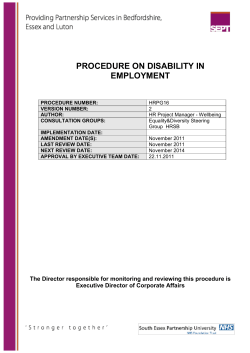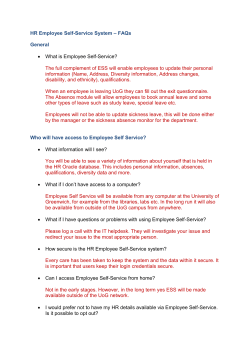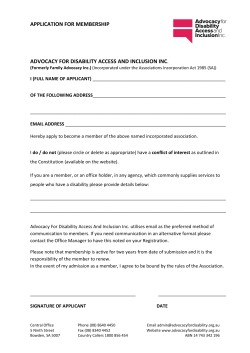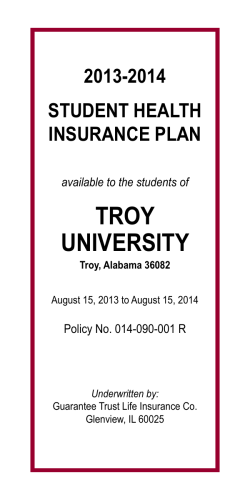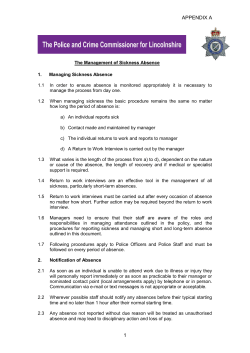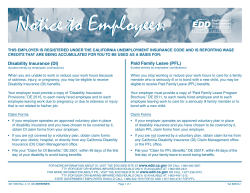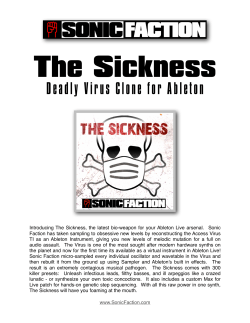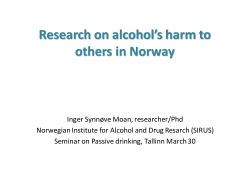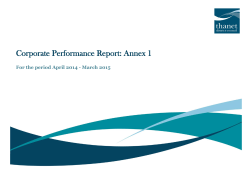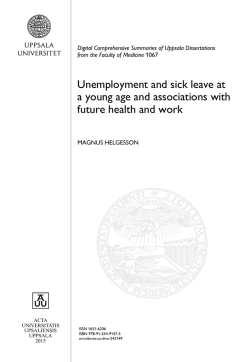
Attendance Management Guidance - Arcadia Lite
Attendance Management Guidance Local Government, Craft and Chief Officials INDEX INTRODUCTION 3 Support Absence Data RIGHT TO BE ACCOMPANIED/REPRESENTED 4 DISABILITY AND THE EQUALITY ACT 4 Reasonable Adjustments STRESS 6 SICKNESS AND ANNUAL LEAVE 6 NOTIFICATION OF REDUCTION OF SICK PAY 7 EXTENSION OF SICK PAY 7 SUSPECTED FRAUDULENT CLAIMS 8 SUSPENSION ON MEDICAL GROUNDS 8 PREGNANCY RELATED ILLNESS 8 ELECTIVE SURGERY 8 SUBSTANCE MISUSE 8 WORK RELATED INJURY 9 TERMINAL ILLNESS 9 INCAPACITY 9 VICTIMS OF CRIME/ABSENCE DUE TO INFECTIOUS DISEASE 9 INDUSTRIAL ACTION 10 27-05-2015 2/11 1. INTRODUCTION The following guidance is designed to ensure fairness and consistency in the handling of sickness absence and also to provide help and support to employees who are subject to illness or injury. It is appreciated that individual circumstances will be taken into account and therefore the guidance is intended to be flexible in its operation to allow line managers some level of discretion. HR&OD will offer advice and guidance to line managers in this regard. Please refer to the Attendance Procedure Local Government, Craft and Chief Officials which details the procedures which require to be undertaken for short and long term absences. It is accepted that the majority of sickness absence is genuine, therefore actions taken under the Attendance Management Policy should not be taken to imply mistrust or concerns about conduct. However, where a manager has concerns that an employee’s absence is not genuine then they should contact HR&OD for advice. Where an employee is dissatisfied with any action taken, the employee should raise this with their Service in the first instance. Support: Please refer to the Attendance Resource Pack for details of the associated policy support and training in relation to attendance management. Please contact HR&OD if you require further assistance. A range of initiatives are in place to encourage and create opportunities for employees to engage in a healthy lifestyle. At any time an employee may contact the Council’s confidential Employee Assistance Programme. Where an employee has disclosed that they have been diagnosed with cancer, please refer to the following guidance – Support for Managers, Employees with Cancer. Absence Data: In order to provide Services with accurate and meaningful information on sickness absence rates and reasons, the Workforce Strategy Team within HR&OD has developed methods to extract, analyse and present this data using a range of industry-recognised measurements of absence, as outlined below: 27-05-2015 3/11 Number of calendar days lost due to sickness during each quarter (also comparison undertaken with previous quarter and comparable period in previous year). Most frequent reasons for absence and total calendar days lost per reason. Number of spells of absence by duration. In addition to the above, sickness absence data focusing on specific jobs and locations is also available on request from HR&OD. Monthly figures are also sent out from the absence and accident recording system. 2. RIGHT TO BE ACCOMPANIED/ REPRESENTED Employees may be accompanied or represented by a colleague or trade union representative as detailed throughout the Attendance Management Procedure. 3. DISABILITY AND THE EQUALITY ACT Aberdeenshire Council is aware that sickness absence may result from a disability. If the employee considers that they are affected by a disability or any medical condition which affects their ability to undertake their work, they should inform their line manager. Absences in connection with sickness arising due to an employee’s disability will be treated as sickness absence. The absence should be considered either under the short-term absence procedure or the long-term absence procedure as appropriate. Once it is considered that an employee has a disability covered by the Equality Act then at each meeting particular consideration must be made as to whether there are any reasonable adjustments that could be made to the requirements of an employee’s post or other aspects of their working arrangements that will provide support at work and/or assist with their return to work. Where an employee has disclosed that they have a disability, the line manager should discuss with them confidentially the effect, if any, of their disability on their work and whether reasonable adjustments are required. In some cases, depending on the individual circumstances, a reasonable adjustment may be to re-assess the application of absence trigger points. Absences not as a result of sickness but arising due to an employee’s disability may fall under the Disability Leave Scheme. This type of leave for example may be for 27-05-2015 4/11 counselling or therapeutic treatment, for example for consultant’s appointments, physiotherapy, hearing aid adjustments/replacements etc. Line managers should refer to the Disability Leave Scheme Guidelines and seek guidance from the Mediation and Employee Relations Team. An employee may also wish to seek advice from a Disability Employment Advisor at their local Job Centre Plus, or from the Equality and Human Rights Commission. Line managers must be aware of the requirements of the Equality Act 2010 when making any decision that affects an employee who may be disabled as defined by the Act. Please also refer to Aberdeenshire Council’s HR Equality Policy. Reasonable Adjustments The Equality Act 2010 places a duty on employers to make “reasonable adjustments” to any provision, criterion or practice that they apply and to physical features of their premises, to accommodate the needs of disabled employees. Please note that reasonable adjustments can be agreed on a temporary, occasional or a permanent basis and subject to review. The purpose of a reasonable adjustment is to remove any disadvantage created by the employee’s disability to perform their day to day duties. It is the employer’s duty to identify, consider and implement adjustments – it is not enough to simply ask the employee their view of what adjustments are required. Facts such as the cost and practicability of making an adjustment and the resources available to you may be taken into account in deciding what is reasonable. Please refer to the How to Guide for Reasonable Adjustments. Access to Work may be able to provide financial support for any approved adjustments. 27-05-2015 5/11 4. STRESS Where an employee has indicated that they are suffering from work related stress it is vital that their manager take the necessary steps at the earliest opportunity to seek an understanding for the reasons behind this. Employees are advised to inform their line manager or if they wish to speak to someone outwith their Service they can contact HR&OD if they believe they are suffering stress-related ill health. Please refer to the Stress Guidance details of the support available and the Stress Self Assessment Questionnaire. 5. SICKNESS AND ANNUAL LEAVE Please refer to Calculating Annual Leave following Long Term Sickness Guidance which details further information and examples. Where an employee is absent due to sickness for a period exceeding three calendar months, annual leave entitlement will be limited to an amount equal to the period actually worked during the contractual leave year. In accordance with the Working Time Regulations, this provision will not be applied so as to reduce the employee’s annual leave entitlement below the statutory minimum. The statutory minimum holiday entitlement is 28 days and includes public holidays. This entitlement should be pro-rated for part-time/part year employees. Therefore, where an employee has been absent for a period exceeding three months, the Service should calculate the leave accrued by the employee during the period of actual work in the leave year. Where this is less than 28 days, then the employee will be entitled to the difference, up to the statutory minimum. Where the absence extends across one leave year into the next, only outstanding accrued leave up the statutory entitlement of 28 days can be carried forward. If, following a long term absence, an employee is unable to return to work, entitlement in the current leave year should be pro-rated to the date of leaving It is expected where possible that employees will take any outstanding annual leave entitlement prior to their return from long term sickness absence. Employees are also entitled to request to designate a part of their absence as annual leave. Employees are required to discuss any such annual leave requests with their line manager in the first instance. 27-05-2015 6/11 No substitute Public Holiday will be given to an employee when they are sick on a public holiday. If an employee becomes ill whilst on holiday, they can only claim reimbursement of annual leave by following the usual absence notification procedures and obtaining a GP certificate to cover the period from the first day of sickness. It is accepted that if the employee is abroad it may be difficult to contact the workplace immediately, but a medical certificate confirming the illness must be obtained and submitted on return to this country. If you are sick on a flexi day you must notify your line manager in accordance with the normal notification procedures and in order for that day to be recorded as sickness absence you must also provide a GP’s certificate. Please note Aberdeenshire Council will not reimburse the cost of the medical certificate. 6. NOTIFICATION OF REDUCTION OF SICK PAY Employees should refer to their Contract of Employment for details of sick pay entitlements. Employees will be contacted by Payroll 3 weeks in advance of the employee’s sick pay reducing from full pay to half pay. Where it is found that entitlement to full pay has already been exhausted, notification of sick pay entitlement will be sent as soon as possible. This notification will also advise of the date at which half pay, full pay and SSP will cease. 7. EXTENSION OF SICK PAY The Council reserves the right to be able to extend the period of sickness pay entitlement in exceptional circumstances, with authorisation of the Head of Service (HR&OD). If an individual continues to work on a part time basis beyond the phased return period this is on the understanding that they will only receive pay for the actual hours worked. Where it is anticipated that a phased return to work may extend beyond the agreed time, this should be discussed with HR&OD. Payroll must be informed by the employee’s line manager, by completion of an EMIS form, of any extensions to a phased return. Please note that a phased return to work may also be applicable in terms of short term absence. 27-05-2015 7/11 8. SUSPECTED FRAUDULENT CLAIMS Where a line manager suspects that an employee may not be genuinely absent, covert surveillance can only be undertaken where authorisation is given and steps are followed in accordance with the Council’s Regulation of Investigatory Powers (Scotland) Act Policy. Please contact the Chief Internal Auditor for further information. 9. SUSPENSION ON MEDICAL GROUNDS In exceptional circumstances if the Director of the Service believes that an employee is unfit for work due to illness, the Council reserves the right to suspend the individual on medical grounds (as a result of medical information) with the authorisation of the Head of Service HR&OD. The employee will be required to comply with any effort to obtain medical information. 10. PREGNANCY RELATED ILLNESS If an employee’s illness is connected with her pregnancy then her maternity leave will automatically begin if the illness commences or continues into the 4 week period before her expected week of confinement. Maternity leave will commence from either the Sunday following the onset of the illness or the first Sunday in the 4 week period, as appropriate. Where the sickness is unconnected to the pregnancy the usual sickness procedure will apply. Please refer to the Maternity Policy and Guidance. 11. ELECTIVE SURGERY There is no statutory right to paid occupational sick leave for elective/cosmetic surgery. Staff choosing to undergo such procedures should discuss the matter with their Line Manager and a member of HR&OD in the first instance to decide how this time off will be taken and recorded. 12. SUBSTANCE MISUSE For any absences related to alcohol and/or drug dependence, please refer to the Council’s Alcohol and Drug Misuse Policy. 27-05-2015 8/11 13. WORK RELATED INJURY Absence due to work related injury will not be counted towards the employee’s sick pay entitlement as Industrial Injury Allowance will be paid instead. The conditions upon which Industrial Injury Allowance shall be paid mirrors the conditions in relation to sickness allowance as detailed in the employee’s conditions of service. Sickness Allowance will not be paid should the absence due to the industrial injury continue after the industrial injury allowance has expired. SSP may be paid once expiry of this allowance if applicable. Payment of industrial injury allowance will be subject to verification of the accident by the Line Manager. Please refer to the Accident Reporting Guidance as certain work related injuries require to be reported to the HSE. Please note the attendance guidance and procedures will still be required to be followed by managers and employees in terms of absences relating to a workplace injury. All Accidents should be reported via your Line Manager and recorded via the Corporate Accident and Incident Reporting Database. 14. TERMINAL ILLNESS Line managers should be aware of the sensitivities of dealing with different types of long term absences, especially in relation to terminal illness. Managers should seek information particularly in connection with obtaining Pension options for the employee if they are a member of the Local Government Pension Scheme, and advising them of these as appropriate. 15. INCAPACITY In circumstances where an employee becomes incapacitated and unable to be contacted then it will be the normal practice that an advocate/next of kin will be required to act in the best interest of an employee. For further advice please contact a member of HR&OD. 16. VICTIMS OF CRIME/ABSENCE DUE TO INFECTIOUS DISEASE For provisions with regards absence resulting from crimes of violence or infectious diseases please refer to HR&OD for further information. 27-05-2015 9/11 Certain occupational diseases have to be reported to the Health and Safety Executive as required under the Reporting of Injuries, Disease and Dangerous Occurrences Regulations (RIDDOR). Please refer to the Accident/Incident Policy & Guidance. 17. INDUSTRIAL ACTION It must be noted that during any periods of industrial action that normal reporting procedures for sickness absence is suspended for any sickness absence that commences on the day of the industrial action. Please refer to the Industrial Action Guidance for more detailed information on the absence reporting procedures that are applicable for any day of industrial action. 27-05-2015 10/11 Index of Documents Policy Revision Date Previous Revision Date Summary of Changes 02-05-2014 - Creation of all Documents 11-09-2014 02-05-2014 Full Revision 27-05-2015 11-09-2014 Update 27-05-2015 11/11
© Copyright 2025

